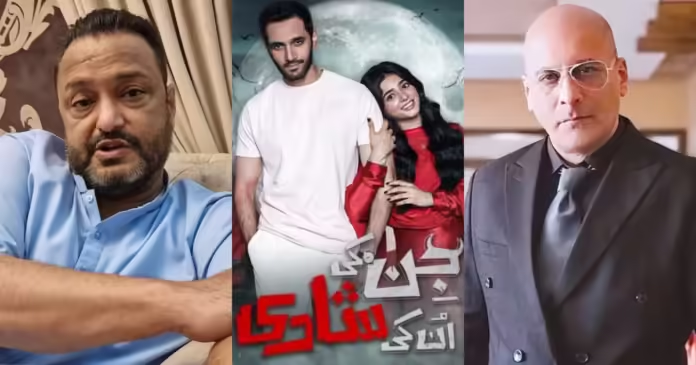Syed Nabeel expressed that actor-director Shamoon Abbasi was the brainchild behind the hit drama Jinn Ki Shadi Unki Shadi
In a surprising but healthy display of sincerity, noted writer Syed Nabeel has openly admitted that the idea of the hit horror-comedy drama Jinn Ki Shadi Unki Shadi was borrowed from actor-director Shamoon Abbasi. The admission is made after Abbasi expressed his dismay at not being given proper credit for the idea, script, and title of the drama.
The revelation has sparked a lively debate in the entertainment industry about creative ownership and the importance of recognition in Pakistan’s evolving television landscape.
Shamoon Abbasi’s Claim: A Story Left Untold
A few days back, Shamoon Abbasi appeared on social media with his version of the story, a revelation that Jinn Ki Shadi Unki Shadi was thought out, titled, and written under his creative vision. Abbasi shared that the project was supposed to be his directorial effort for Hum TV and that the circulated script was still bearing his name.
The veteran actor expressed disappointment over being excluded from the final credits despite his original involvement. Abbasi’s statement quickly gained traction among fans and fellow artists, reigniting discussions on transparency and ethics in showbiz collaborations.
Syed Nabeel’s Response: “Yes, the Concept Was Shamoon’s”
Breaking his silence, Syed Nabeel responded gracefully, confirming that Shamoon Abbasi’s claims were indeed valid. He clarified that the core idea and concept of Jinn Ki Shadi Unki Shadi came from Abbasi, while Nabeel later developed the script further and brought it to production.
Nabeel’s admission has been widely welcomed as an act of integrity and professionalism—qualities hard to find in the highly competitive showbiz industry. His statement not only assures Abbasi of his creative contribution but also establishes a precedent for equitable crediting in Pakistani media.
In spite of the controversy, Jinn Ki Shadi Unki Shadi still manages to thrill audiences with its interesting blend of horror, comedy, and emotional narrative. Featuring Wahaj Ali and Sehar Khan, the series has emerged as a new wave on television, appreciated for its offbeat plot and captivating performances.
The camaraderie among the lead actors and the show’s lighthearted supernatural theme have ensured that it is one of the season’s most buzzed-about dramas. Fans have especially enjoyed its blend of lighthearted entertainment and unsettling suspense—a combination seldom done so masterfully on Pakistani television.
A Lesson in Acknowledgment and Cooperation
The drama that followed Jinn Ki Shadi Unki Shadi highlights a significant lesson in collaborative creativity—acknowledgment is key. In an industry where several minds are involved in working on one project, providing credit where credit is due is not just an ethical requirement but a mark of artistic maturity.
Both Syed Nabeel and Shamoon Abbasi have since gained respect for their professional approach to the situation—Abbasi for asserting his creative rights, and Nabeel for being truthful in acknowledging another artist’s work.
As the drama keeps winning hearts nationwide, its behind-the-scenes tale has turned as intriguing—a reminder that at the heart of every successful production is a string of creative minds whose work warrants acknowledgment.
On or off screen, Jinn Ki Shadi Unki Shadi has accomplished something that not many dramas do—it’s triggered laughter, curiosity, and now, a critical dialogue about respect and fairness within the entertainment industry.
Visit Pakistan Updates for additional news, views, and stories from Pakistan’s entertainment sector.




